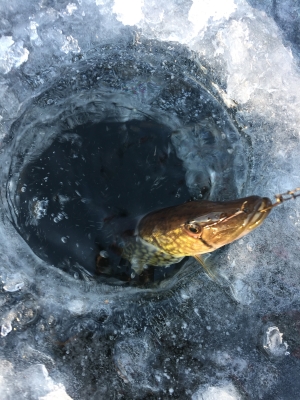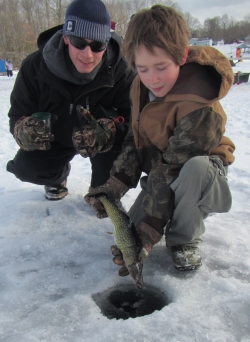Ice Fishing
Ice Fishing is a great and safe way to beat cabin fever and spend quality time with family and friends outdoors. If you are interested in learning more about ice fishing, take our self-paced online ice fishing course Introduction to Ice Fishing, view our Let's Go Ice Fishing video, or take one of our FREE learn to ice fish classes (information below).
The CT DEEP Fisheries Division - Connecticut Aquatic Resources Education (CARE) Learn to Ice Fish classes in January and February. We will cover safety on the ice, how to dress for the cold, where to go, ice fishing equipment, baits, techniques, and tactics during the ZOOM and in-person classroom sessions. Join us on the ice at a fishing field trip to practice your new skills with expert anglers who are ready to assist you and answer all your ice fishing questions. Sign up for classes and fields trips below.
NOTE: Ice fishing trips are subject to a minimum of 7" of safe ice.
View our complete schedule of ice fishing classes and events: CARE Fishing Classes
Ice Fishing Class (In-Person)
These in-person classes are taught by CARE instructors and cover safety on the ice, how to dress for the cold, where to go, ice fishing equipment, baits, techniques, and tactics! Expert instructors are available to answer questions and will have all ice fishing equipment on-hand for display and demonstration. This is an instructional class only. Signup for an ice fishing field trip below if you want to practice your new skills.Ice Fishing Class (ZOOM)
These online classes are taught by CARE instructors using ZOOM. We will cover safety on the ice, how to dress for the cold, where to go, ice fishing equipment, baits, techniques, and tactics during the class. Experts will be available to answer all your ice fishing questions.Ice Fishing Class and Fishing Field Trip
These in-person classes are taught by CARE instructors and provide a unique an opportunity to practice your new skills on the ice with expert anglers after the instructional class. We will cover safety on the ice, how to dress for the cold, where to go, ice fishing equipment, baits, techniques, and tactics during the class. Then, we will head onto a local waterbody where Instructors will be available to assist you in drilling holes, setting up gear, and reeling in fish. Tackle and bait are provided. Anglers over 16 years old need a fishing license. Dress appropriately to be on the ice.
 Tips and Pointers for Safe and Fun Ice Fishing
Tips and Pointers for Safe and Fun Ice Fishing
Safety first: A rule of thumb for ice safety is “there is no 100% guarantee”. Ice thickness and strength will vary from place to place. Be sure to “test” the thickness as you go – do not assume. Generally, four to five inches or more of clear ice is acceptable for a small group ice fishing. Learn more about ice safety.
Ice formation depends on the combination of many things including:
- the size of the water (small pond versus large lake),
- the depth of the water,
- objects sticking out of the water like boulders and logs,
- proximity to moving water (like the inlet and outlet),
- amount and angle of the sun
- recent weather conditions (air temperatures and precipitation).
Be Prepared – Just in Case:
- Tell someone where you will be.
- Carry hand ice picks, a throw-able rope, a flotation device, whistle, and a cell phone.
- Take a friend or two.
Dress the Part:
- Dress in layers and avoid cotton.
- Wear a windproof outer layer, waterproof boots, and thick wool socks.
- Mittens and a hat are a must.
- Sunglasses are recommended to protect the eyes from the glare.
- Use creepers or other traction devices for your boots (ice can be very slick).
Make It Memorable:
- Go as a group, bring the family.
- Pack a picnic or bring a small portable stove or grill .
- Bring hot chocolate (especially if you take kids).
- Multi task with ice skates, snow shoes, or cross county skis while waiting for the flags to go up.
- Post some pics to social media.
- Take home some delicious fresh fish for dinner.
 Popular State Owned Public Access for Ice Fishing:
Popular State Owned Public Access for Ice Fishing:
Western CT: East Twin Lake, Salisbury; Dog Pond, Tyler Lake and Westside Pond, Goshen, Squantz Pond, New Fairfield, Highland Lake, Park Pond, and Winchester Lake, Winchester, Burr Pond and Stillwater Pond, Torrington, West Hill Pond, Barkhamsted, Bantam Lake, Morris/Litchfield; Mohawk Pond, Cornwall/Goshen, Wood Creek Pond, Norfolk; Mount Tom Pond, Washington
Central CT: Batterson Park Pond, New Britain; Wethersfield Cove, Wethersfield; Keney Cove, Glastonbury, Crystal Lake, Ellington; Moodus Reservoir, East Haddam, Lake Beseck, Middlefield; Black Pond, Middlefield; Silver Lake, Berlin
Eastern CT: Mashapaug Pond and Bigelow Pond, Union; Mansfield Hollow Reservoir, Mansfield; Coventry Lake, Coventry; Pachaug Pond and Beach Pond, Voluntown; Gardner Lake, Bozrah
Equipment Regulations:
Each person is allowed to have up to 6 tip-ups, hand held jigging rods, or similar devices in total. Each line can have up to 3 types of ice fishing hooks/bait/lures in total. All lines/devices must be personally attended at all times and have the name and address of the user printed legibly on or attached to the device (refer to the definition in the Fishing Guide).
Learn more about ice fishing in these informative articles published in Connecticut Wildlife Magazine:
- Catching Memories You Will Not Release
- Families Who Fish Together Eat Together
- Fishing the Hard Water Is a "Hole" New Adventure
- Ice Fishing Tips
Please contact the Fisheries Division with any questions.
Phone: 860-424-FISH (3474)
E-mail: deep.inland.fisheries@ct.gov
Content last updated in February 2025.




